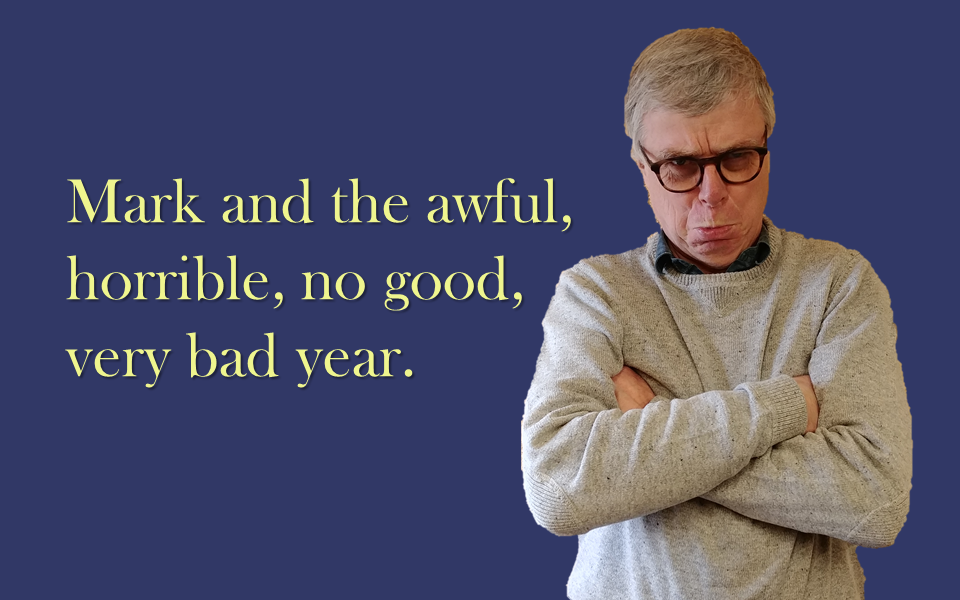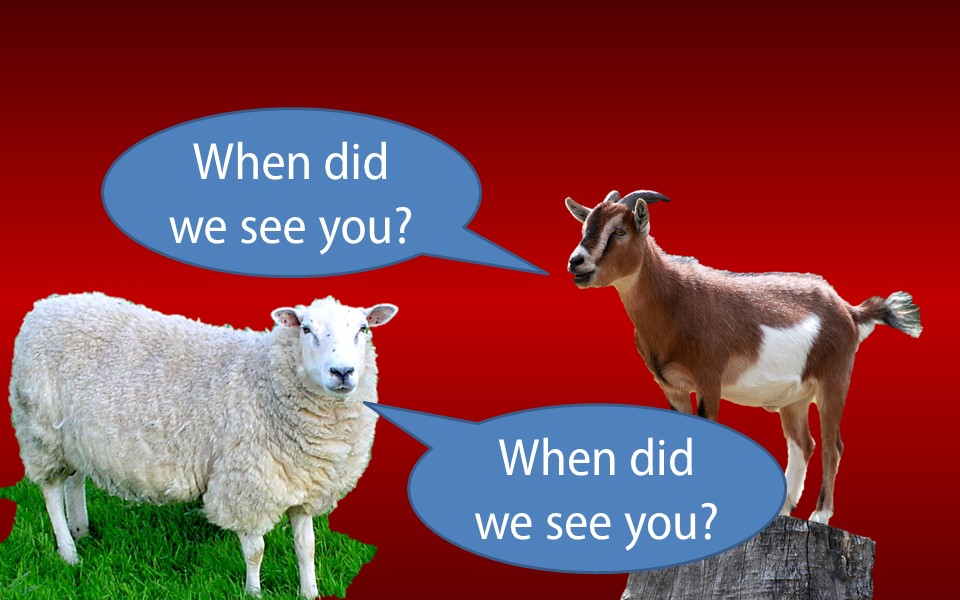Hespeler, 29 November 2020 © Scott McAndless
Isaiah 64:1-9, Psalm 80:1-7, 17-19, 1 Corinthians 1:3-9, Mark 13:14-37 (click to read)
I’m going to ask you to use your imaginations here for a little bit. I want you to imagine a year, an entire year, that just went really badly. A year during which just about everything you could possibly think of to go wrong went wrong and a bunch of other things that you would never think of in a million years also went wrong. Say that that year began with terrible, almost apocalyptic bushfires in the far distant continent of Australia killing or displacing an unimaginable number of animals, something like 3 billion. And then say that, only weeks later, a terrible pandemic began to sweep across the globe shutting down ordinary life and leading, ultimately, to tens of millions of cases and well over a million deaths.
And then throw a few other things into this imaginary year – cases of what clearly appear to be racially motivated police violence leading to massive protests and in some cases rioting and violence. Throw in a sharply divisive election and a transition of power wrought with confusion and fear. Hey, while you’re at it, why not throw in a few murder hornets? You know just a wildly unrealistic awful, horrible, no good, very bad year.
And imagine that you were coming to the close of that year with some hope, of course, that maybe the next year would be a lot better but, at the same time, a fair bit of worry that it might just be a whole lot worse. So, say it was around the end of November of that year. What do you suppose the mood of people would be? And given that mood, that I suspect you can probably imagine, what do you suppose that somebody might write that could actually reach people, catch their attention and speak to them exactly where they were?

I ask that question today because it is the First Sunday of Advent which the church counts as the beginning of the year. And, as it is the beginning of the year, we turn, on this Sunday to a new part of the Sunday lectionary. Last year, our gospel readings were mostly taken from the Gospel according to Matthew. Starting today, we are going to turn to a new gospel: the Gospel of Mark.
And what an introduction to the Gospel of Mark we have in our reading this morning: the sun darkened, the moon dimmed and the stars falling from heaven and, indeed, heaven and earth entirely passing away. Now, I know that this passage in the Gospel of Mark is not necessarily everybody’s favourite, but I think that it is actually a very good thing that this very passage is actually our introduction to the entire book in our readings for this year.
Most scholars today believe that of all the gospels in the Bible, the Gospel of Mark is the oldest; it was the first one written. Now the reasons why scholars believe this are rather complicated and I’d be happy to get into the details at some other time, but for the moment, let’s just say that sometime around 70 AD, that is about four decades after the death and resurrection of Jesus, somebody first came up with the idea of writing down the story of Jesus’ life and death, and this gospel was the result.
That immediately raises some questions – questions like, why then? Why, at that moment in the history of church, did someone finally feel compelled (or inspired by the Spirit) to write down the story of Jesus? Did it have something to do with the fact that the first generation of believers was, at that point, passing away and they felt a certain urgency to collect and write down their witness? That may have been part of it, but I am not sure that it was the main part.
No, I suspect that it had more to do with what was going on in the world at that moment in time. Because, as I said, the consensus is that Gospel of Mark was written sometime around 70 AD. And 70 AD was an awful, horrible, no good, very bad year. What’s more, 70 AD was only one in the midst of a number of awful, horrible, no good, very bad years from about 66 to 74 AD. So it actually doesn’t matter what exact year the Gospel of Mark was written, we can be pretty sure that it was written during an awful, horrible, no good, very bad year.
Let me just give you some sense of all the horrible things that happened during that period of time. It started in Judea when somebody made fun of the local Roman governor but, when the governor tried to find the people who’d made fun of him, they’d gone missing and so he just grabbed a whole bunch of people at random and crucified them which led to a bloody general uprising. During this period of time, the reign of the worst Roman Emperor ever, Nero, finally came to an end, but it led to the worst and most violent succession crisis that you can possibly imagine. Does that sound familiar?
During that crisis, one prominent Jew looked at one of the people fighting to be the next emperor (who happened to be in Judea killing Judeans at the time) and said, “Look, there is the messiah!” Now, can you imagine that? A powerful political leader hailed as the true messiah? Well, it happened.
And then, the whole countryside of Judea and Galilee blew up an open revolt against Rome which was brutally defeated by the son of the new emperor at the cost of thousands of lives and the destruction of the temple and the city of Jerusalem.
During one of these horrible years, it is said the Christian church that was in Jerusalem was so alarmed by the whole situation that they up and ran, leaving everything behind them to escape the city – an episode that is likely referred to in our reading when Jesus says, “When you see the desolating sacrilege set up where it ought not to be (let the reader understand), then those in Judea must flee to the mountains; the one on the housetop must not go down or enter the house to take anything away; the one in the field must not turn back to get a coat. Woe to those who are pregnant and to those who are nursing infants in those days! Pray that it may not be in winter.”
That is the kind of thing that was going on while this gospel was being written. And again, I ask you the question, why, at that kind of moment, did someone decide to write this book. Do you suppose that it might have been because somebody decided that just such a book as this was exactly what was needed at such a moment as that? I suspect that this is exactly what happened. The Gospel of Mark was not written merely to record what happened to Jesus during his life, though it certainly did that, but it was also written to give comfort and guidance to some people who had just lived through an awful, horrible, no good, very bad year.
I think that is true of the entire Gospel of Mark, but it is maybe especially true of the thirteenth chapter of the Gospel which we read from today because it most directly references some of the very things that were going on when this book was written. So what was the message that the writer of the Gospel of Mark was trying to give to people who were living through such times?
Well, one thing is especially clear in this chapter. He wrote it to tell people that this had all been foreseen. In this chapter, he particularly highlights the very things that Jesus predicted would happen and that were now coming to pass. Jesus did predict the destruction of the temple and much of the strife that surrounded it. And so Mark underlines that prediction and, I suspect, doesn’t hesitate to add a few details from the things that he and his fellow Christians have recently lived through.
Now, what would be the point in doing that? How is that supposed to help people deal with all they are going through? Well one thing it tells people is that nothing that has happened is as random as it might seem – that it has all been foreseen.
Now, I don’t think that that is the same thing as saying that every bad thing that happens is a direct result of the will of God. I personally do not believe that God wills that bad or tragic things happen to anyone. But tragedy is an inevitable part of life in this world and our loving God is never far removed from the struggles that people are living through. And, yes, I do think that this was exactly the kind of message that people needed to hear when this book was written.
Think of that in terms of some of the things we’ve been living through. Does the mere fact that a lot of what we have been living through was actually predicted seem like a comforting thought to you? Because it is largely true. We have been warned very clearly for a number of years now that a devastating global pandemic was bound to come sooner or later. We have been clearly warned that the effects of global warming would lead to worse and worse hurricane seasons and worse and worse forest fire seasons and we have just lived through the worst of all recorded times in both cases. Certainly, the post-election strife in the United States that we are living through right now has been predicted over and over again over the last four years.
It has all been predicted, but does that make us feel any better about any of it? Not necessarily. But maybe it does give us an imperative to listen to those who make such predictions next time and to do what we can to prepare a whole lot better. It may not give us comfort but it gives us a sense of agency, of something we can do, and that is maybe the kind of thing we need right now. I think the Gospel of Mark provided something like that for its audience.
And, if there was a comfort to be found, it was to be found in the knowledge that somewhere above and beyond the troubles of an awful, horrible, no good, very bad year, there was someone who had a plan that looked beyond the troubles of the moment to something bigger, to the redemption of a troubled world and its ultimate healing. That also was a comfort to them and I think it can also be for us.
I suspect that there is a reason why God is leading us, through the Revised Common Lectionary, towards reflecting on the Gospel of Mark as an awful, horrible, no good, very bad year comes to a close and a new year begins. I suspect this gospel has some really important things to say to us exactly where we are right now.
I pray that, in the year to come, this gospel might give us some perspective on the difficult things that we have had to live through this year and that might linger in the year to come. Like I say, I don’t believe that it is God’s desire that bad things happen to us, but that does not change the fact that we have a God who oversees the events of this world, who cares and who is determined to bring some good out of the most troubling developments.
Of course, the other thing that the Gospel of Mark gives us is a picture of Jesus. As the first Gospel written (or at least the first one written that was not lost), Mark shows us who Jesus is in the midst of the struggles of this life. And the picture we get is of the Son of God but also of one who is not removed from the struggles of this world, who entered into them willingly and freely, who knows our difficulties and comforts us in them. Because, you see, Mark was determined to present the kind of saviour that people who have lived through an awful, horrible, no good, very bad year really need to meet.



